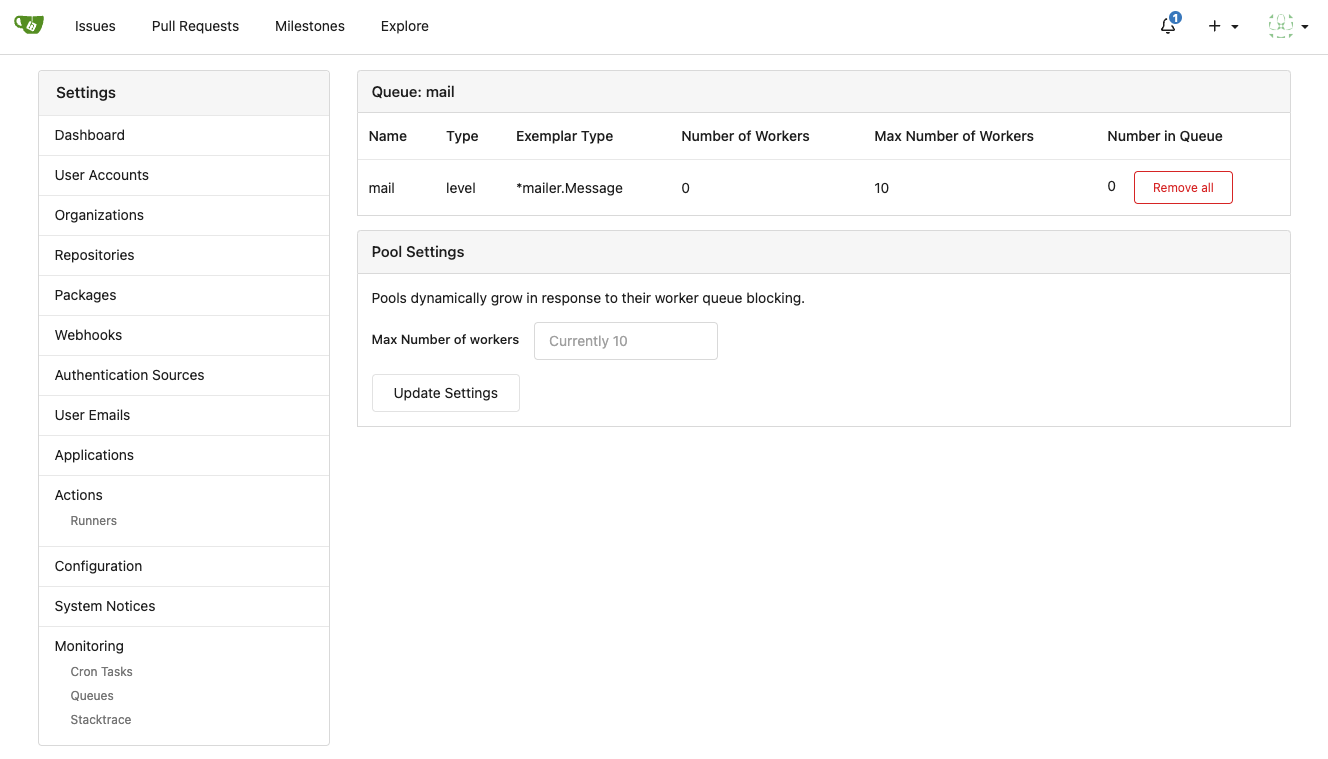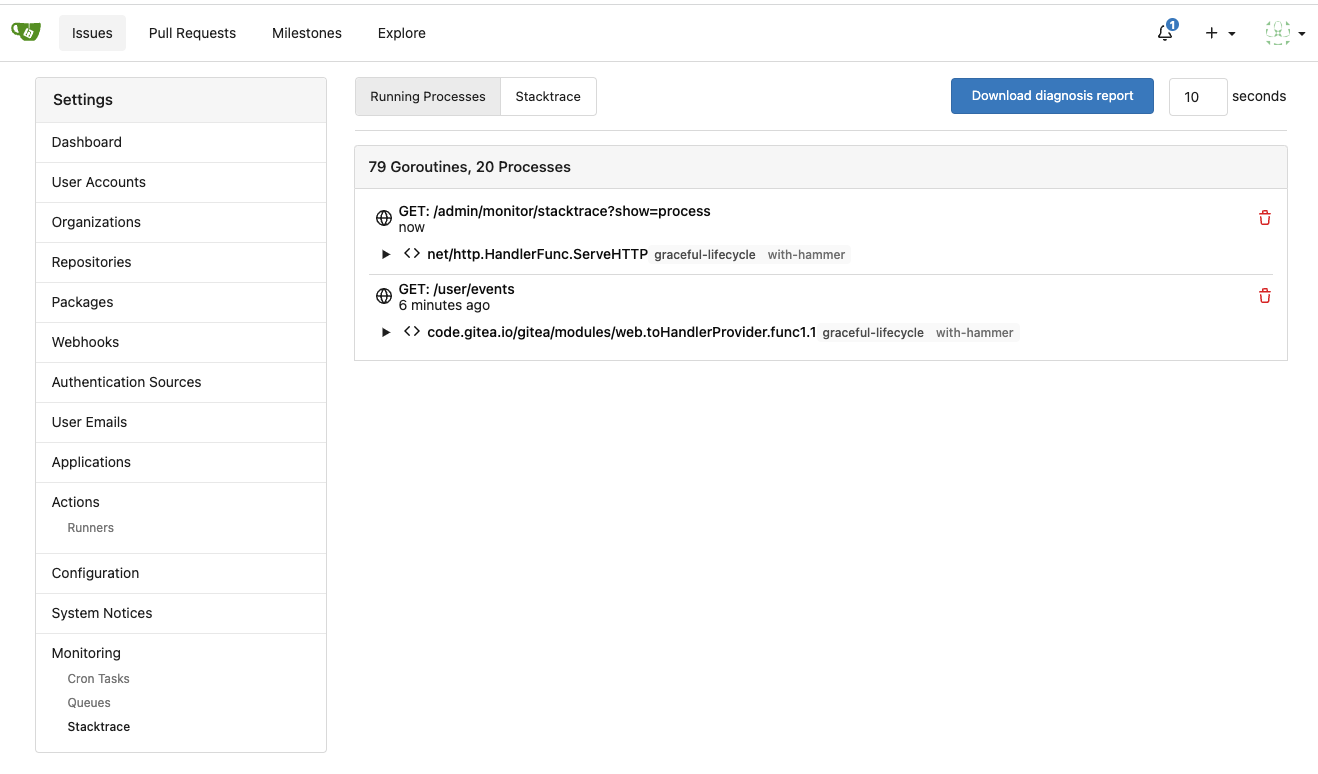mirror of
https://github.com/go-gitea/gitea
synced 2024-11-17 23:54:25 +00:00
Although some features are mixed together in this PR, this PR is not
that large, and these features are all related.
Actually there are more than 70 lines are for a toy "test queue", so
this PR is quite simple.
Major features:
1. Allow site admin to clear a queue (remove all items in a queue)
* Because there is no transaction, the "unique queue" could be corrupted
in rare cases, that's unfixable.
* eg: the item is in the "set" but not in the "list", so the item would
never be able to be pushed into the queue.
* Now site admin could simply clear the queue, then everything becomes
correct, the lost items could be re-pushed into queue by future
operations.
3. Split the "admin/monitor" to separate pages
4. Allow to download diagnosis report
* In history, there were many users reporting that Gitea queue gets
stuck, or Gitea's CPU is 100%
* With diagnosis report, maintainers could know what happens clearly
The diagnosis report sample:
[gitea-diagnosis-20230510-192913.zip](https://github.com/go-gitea/gitea/files/11441346/gitea-diagnosis-20230510-192913.zip)
, use "go tool pprof profile.dat" to view the report.
Screenshots:



---------
Co-authored-by: Jason Song <i@wolfogre.com>
Co-authored-by: Giteabot <teabot@gitea.io>
139 lines
3.4 KiB
Go
139 lines
3.4 KiB
Go
// Copyright 2023 The Gitea Authors. All rights reserved.
|
|
// SPDX-License-Identifier: MIT
|
|
|
|
package queue
|
|
|
|
import (
|
|
"context"
|
|
"sync"
|
|
"time"
|
|
|
|
"code.gitea.io/gitea/modules/graceful"
|
|
"code.gitea.io/gitea/modules/log"
|
|
"code.gitea.io/gitea/modules/nosql"
|
|
|
|
"github.com/redis/go-redis/v9"
|
|
)
|
|
|
|
type baseRedis struct {
|
|
client redis.UniversalClient
|
|
isUnique bool
|
|
cfg *BaseConfig
|
|
|
|
mu sync.Mutex // the old implementation is not thread-safe, the queue operation and set operation should be protected together
|
|
}
|
|
|
|
var _ baseQueue = (*baseRedis)(nil)
|
|
|
|
func newBaseRedisGeneric(cfg *BaseConfig, unique bool) (baseQueue, error) {
|
|
client := nosql.GetManager().GetRedisClient(cfg.ConnStr)
|
|
|
|
var err error
|
|
for i := 0; i < 10; i++ {
|
|
err = client.Ping(graceful.GetManager().ShutdownContext()).Err()
|
|
if err == nil {
|
|
break
|
|
}
|
|
log.Warn("Redis is not ready, waiting for 1 second to retry: %v", err)
|
|
time.Sleep(time.Second)
|
|
}
|
|
if err != nil {
|
|
return nil, err
|
|
}
|
|
|
|
return &baseRedis{cfg: cfg, client: client, isUnique: unique}, nil
|
|
}
|
|
|
|
func newBaseRedisSimple(cfg *BaseConfig) (baseQueue, error) {
|
|
return newBaseRedisGeneric(cfg, false)
|
|
}
|
|
|
|
func newBaseRedisUnique(cfg *BaseConfig) (baseQueue, error) {
|
|
return newBaseRedisGeneric(cfg, true)
|
|
}
|
|
|
|
func (q *baseRedis) PushItem(ctx context.Context, data []byte) error {
|
|
return backoffErr(ctx, backoffBegin, backoffUpper, time.After(pushBlockTime), func() (retry bool, err error) {
|
|
q.mu.Lock()
|
|
defer q.mu.Unlock()
|
|
|
|
cnt, err := q.client.LLen(ctx, q.cfg.QueueFullName).Result()
|
|
if err != nil {
|
|
return false, err
|
|
}
|
|
if int(cnt) >= q.cfg.Length {
|
|
return true, nil
|
|
}
|
|
|
|
if q.isUnique {
|
|
added, err := q.client.SAdd(ctx, q.cfg.SetFullName, data).Result()
|
|
if err != nil {
|
|
return false, err
|
|
}
|
|
if added == 0 {
|
|
return false, ErrAlreadyInQueue
|
|
}
|
|
}
|
|
return false, q.client.RPush(ctx, q.cfg.QueueFullName, data).Err()
|
|
})
|
|
}
|
|
|
|
func (q *baseRedis) PopItem(ctx context.Context) ([]byte, error) {
|
|
return backoffRetErr(ctx, backoffBegin, backoffUpper, infiniteTimerC, func() (retry bool, data []byte, err error) {
|
|
q.mu.Lock()
|
|
defer q.mu.Unlock()
|
|
|
|
data, err = q.client.LPop(ctx, q.cfg.QueueFullName).Bytes()
|
|
if err == redis.Nil {
|
|
return true, nil, nil
|
|
}
|
|
if err != nil {
|
|
return true, nil, nil
|
|
}
|
|
if q.isUnique {
|
|
// the data has been popped, even if there is any error we can't do anything
|
|
_ = q.client.SRem(ctx, q.cfg.SetFullName, data).Err()
|
|
}
|
|
return false, data, err
|
|
})
|
|
}
|
|
|
|
func (q *baseRedis) HasItem(ctx context.Context, data []byte) (bool, error) {
|
|
q.mu.Lock()
|
|
defer q.mu.Unlock()
|
|
if !q.isUnique {
|
|
return false, nil
|
|
}
|
|
return q.client.SIsMember(ctx, q.cfg.SetFullName, data).Result()
|
|
}
|
|
|
|
func (q *baseRedis) Len(ctx context.Context) (int, error) {
|
|
q.mu.Lock()
|
|
defer q.mu.Unlock()
|
|
cnt, err := q.client.LLen(ctx, q.cfg.QueueFullName).Result()
|
|
return int(cnt), err
|
|
}
|
|
|
|
func (q *baseRedis) Close() error {
|
|
q.mu.Lock()
|
|
defer q.mu.Unlock()
|
|
return q.client.Close()
|
|
}
|
|
|
|
func (q *baseRedis) RemoveAll(ctx context.Context) error {
|
|
q.mu.Lock()
|
|
defer q.mu.Unlock()
|
|
|
|
c1 := q.client.Del(ctx, q.cfg.QueueFullName)
|
|
// the "set" must be cleared after the "list" because there is no transaction.
|
|
// it's better to have duplicate items than losing items.
|
|
c2 := q.client.Del(ctx, q.cfg.SetFullName)
|
|
if c1.Err() != nil {
|
|
return c1.Err()
|
|
}
|
|
if c2.Err() != nil {
|
|
return c2.Err()
|
|
}
|
|
return nil // actually, checking errors doesn't make sense here because the state could be out-of-sync
|
|
}
|